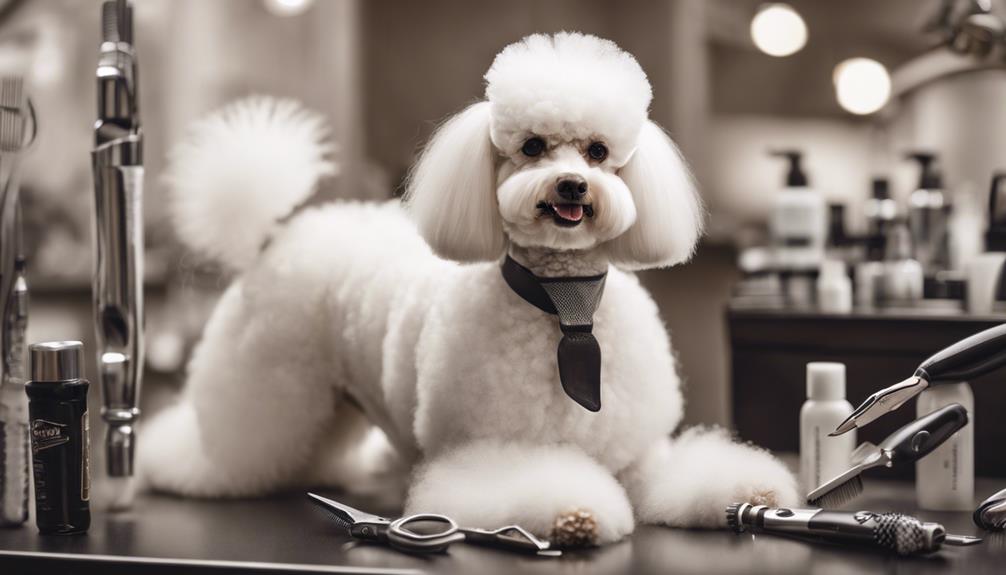Did you know that having a furry companion at home can actually improve your overall well-being? Research has shown that owning a dog can decrease stress, boost physical activity, and offer emotional support. However, with a wide variety of breeds available, it can be challenging to decide which one is the most suitable for your home and lifestyle.
In this article, we will guide you through the process of selecting the perfect breed for your house. Whether you live in a small apartment or have a spacious yard, there is a breed out there that will be a perfect fit for you. We will explore small breeds for limited living spaces, medium breeds for a balanced energy level, large breeds for spacious homes or yards, and even hypoallergenic options for those with allergies.
By the end of this article, you’ll have all the information you need to make an informed decision and find the best furry companion to bring joy and love into your home.
Key Takeaways:
- Choosing the right breed of dog is crucial for finding a good house dog.
- There are different breeds suitable for various living situations and lifestyles.
- Small breeds are ideal for limited living spaces, while medium and large breeds require more space and exercise.
- Hypoallergenic breeds are a great option for allergy sufferers.
- By considering factors such as size, energy levels, and compatibility with your home, you can find the perfect furry companion.
Tips for Choosing the Right Dog Breed for Your Home
When it comes to finding the perfect dog breed for your home, there are several important factors to consider. By taking into account your housing situation, the size of the dog, their exercise needs, shedding, trainability, and price, you can make an informed decision that will result in a happy and harmonious relationship with your new furry friend.
Here are five tips to help you choose the best dog breed for your home:
- Assess your housing situation: Different breeds have different space requirements. If you live in an apartment or have limited outdoor space, a small or medium-sized breed may be more suitable. However, if you have a spacious home or a large yard, you might consider a larger breed that requires more room to roam.
- Consider the size of the dog: Size matters when it comes to choosing a dog breed. Smaller breeds are generally easier to handle and require less exercise, making them a good choice for individuals or families with less active lifestyles. On the other hand, larger breeds tend to be more energetic and may need more space and exercise to stay happy and healthy.
- Evaluate exercise needs: It’s important to match your dog’s exercise needs with your lifestyle. Some breeds require extensive daily exercise, such as long walks or vigorous playtime, while others are content with shorter, less demanding activities. Make sure you can provide the necessary level of physical activity to keep your dog healthy and mentally stimulated.
- Consider shedding: If you or your family members have allergies or simply prefer a cleaner living environment, you may want to choose a breed that sheds less. Some breeds, known as hypoallergenic breeds, produce fewer allergens and are less likely to cause allergic reactions. Keep in mind that even hypoallergenic breeds require regular grooming to maintain their coat and minimize shedding.
- Factor in trainability and temperament: Different breeds have varying levels of trainability and temperament. If you’re a first-time dog owner or prefer a dog that is easy to train and eager to please, you may want to consider a breed known for its intelligence and willingness to learn. On the other hand, if you have experience with dogs and enjoy a challenge, a more independent and spirited breed might be a better fit.
By considering these tips and taking the time to research different breeds, you can make an informed decision and find the perfect dog breed that will be a wonderful addition to your home and family.
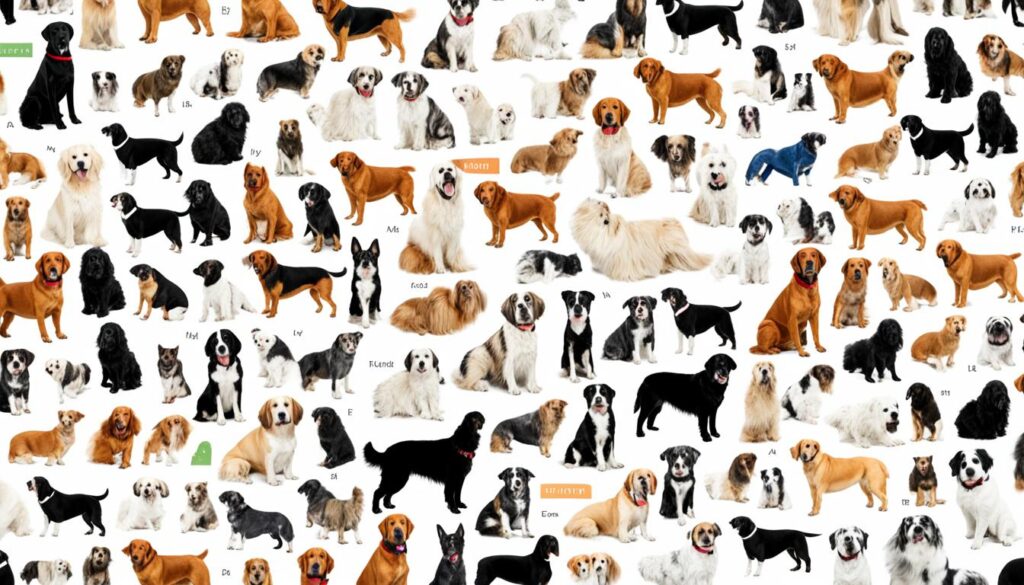
| Breed | Housing Suitability | Exercise Needs | Shedding | Trainability | Price |
|---|---|---|---|---|---|
| Labrador Retriever | Spacious homes or yards | High exercise needs | Moderate shedding | Highly trainable | $$ |
| French Bulldog | Small apartments | Low exercise needs | Low shedding | Moderately trainable | $$ |
| Border Collie | Spacious homes or active families | High exercise needs | Moderate shedding | Highly trainable | $$$ |
| Beagle | Small apartments or homes with yards | Moderate exercise needs | Moderate shedding | Moderately trainable | $$ |
| Bichon Frise | Small apartments or homes with yards | Low exercise needs | Minimal shedding | Moderately trainable | $$ |
Expert Tip
“Remember that every dog is an individual, and breed characteristics are just a general guideline. Consider adopting a mixed breed dog from a shelter or rescue organization. They can make wonderful companions and may possess a unique mix of traits that perfectly fits your home and lifestyle.” – Dr. Sarah Anderson, Animal Behavior Specialist
Small House Dog Breeds for Limited Living Space
Living in a limited space doesn’t mean you have to miss out on the joys of owning a dog. Small house dog breeds are a perfect choice for people who live in apartments or smaller homes. Despite their small size, these breeds can still provide the love, companionship, and loyalty that dog owners desire.
Small house dog breeds typically require less exercise and space compared to larger breeds. They are known for their adaptability and can thrive in limited living spaces. These pint-sized pups are a delightful addition to any household, bringing joy and endless entertainment to their owners.

| Breed | Personality | Characteristics |
|---|---|---|
| Chihuahua | Fearless, Lively, Devoted | Small size, Alert expression, Big personality |
| French Bulldog | Easygoing, Affectionate, Playful | Pug-like appearance, Bat ears, Smooth coat |
| Pomeranian | Intelligent, Cheerful, Friendly | Fluffy double coat, Fox-like face, Curled tail |
| Boston Terrier | Friendly, Intelligent, Energetic | Gentlemanly and dapper appearance, Short coat |
These small house dog breeds offer a variety of personalities and characteristics, ensuring that you’ll find the perfect match for your lifestyle and preferences. Whether you’re looking for a spirited companion or a laid-back cuddler, there’s a small dog breed that will bring joy and love into your home.
Medium Breeds for a Balanced Energy Level
Medium breeds are the perfect choice for families looking for a dog that is not too small or too large. These breeds offer a balanced energy level, making them adaptable and great companions for both children and other pets. With their moderate exercise needs and space requirements, medium breeds are well-suited to families with a bit more room to offer.
Popular Medium Breeds
Here are some popular medium breeds that are known for their balanced energy levels:
- Cocker Spaniel: Known for their friendly nature and beautiful coat, Cocker Spaniels are affectionate and adaptable dogs. They thrive with regular exercise and enjoy participating in various activities.
- Border Collie: Border Collies are highly intelligent and energetic dogs, making them excellent companions for active families. They have a natural herding instinct and require mental stimulation alongside physical exercise.
- Australian Shepherd: With their boundless energy and agility, Australian Shepherds are well-suited to families who enjoy outdoor activities. They are highly trainable and excel in obedience and agility trials.
- Bulldog: Bulldogs are known for their calm and friendly demeanor. They have a moderate energy level and are content with daily walks and playtime. Bulldogs are excellent family pets and are great with children.
These medium breeds offer the perfect balance between an active lifestyle and relaxation, making them ideal companions for families who want a furry friend that can adapt to their daily routines.
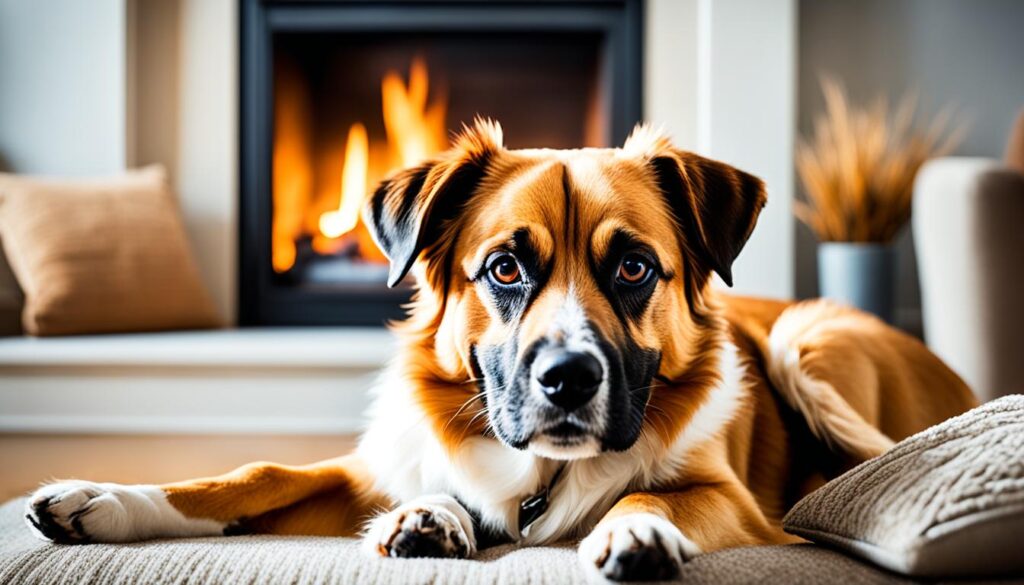
Having a medium-sized dog by your side can bring joy and companionship to your family. Whether you’re going for a hike in the mountains or enjoying a cozy evening at home, these breeds will be by your side, ready to join in on the fun.
Large House Dog Breeds for Spacious Homes or Yards
If you have plenty of space to offer and a high energy level, large house dog breeds may be the perfect fit for you. These breeds are typically larger in size and require more exercise and space. They are great for families with larger homes or yards. Let’s explore some popular large house dog breeds known for their playful and protective nature:
1. Labrador Retrievers
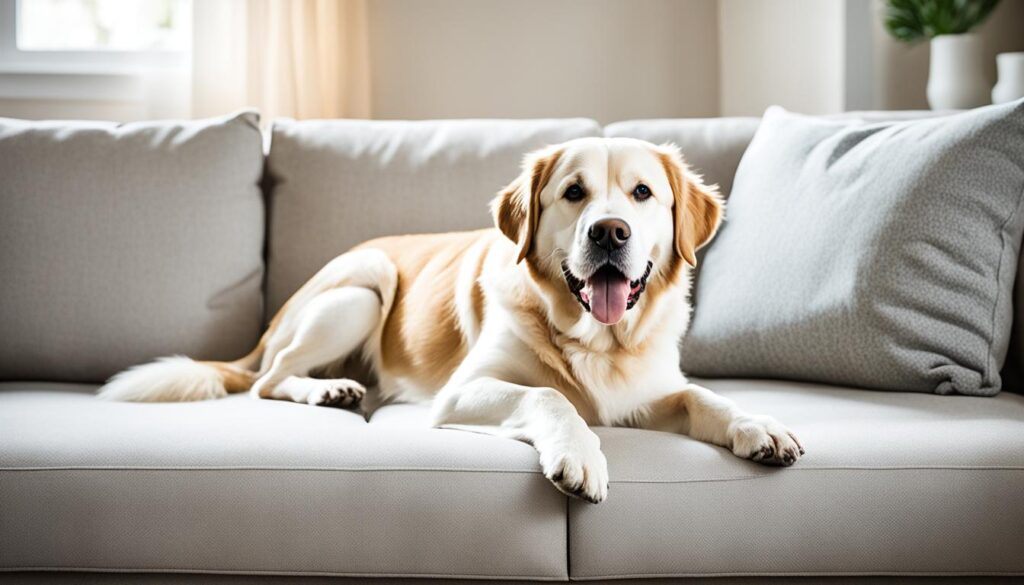 Labrador Retrievers are one of the most popular breeds for families with spacious homes or yards. They are playful, enthusiastic, and extremely friendly. Labradors have a high energy level and require regular exercise to keep them mentally and physically stimulated. They are great with children and other pets, making them a delightful addition to any family.
Labrador Retrievers are one of the most popular breeds for families with spacious homes or yards. They are playful, enthusiastic, and extremely friendly. Labradors have a high energy level and require regular exercise to keep them mentally and physically stimulated. They are great with children and other pets, making them a delightful addition to any family.
2. Golden Retrievers
Golden Retrievers are intelligent, devoted, and highly adaptable dogs. They thrive in spacious homes or yards where they can run and play freely. Golden Retrievers are known for their friendly nature and love for people, making them excellent family pets. They require regular exercise and mental stimulation to prevent boredom and maintain their well-being.
3. Newfoundlands
Newfoundlands are gentle giants that are well-suited to spacious homes with large yards. They are known for their calm and patient temperament, making them excellent companions for families. Despite their massive size, Newfoundlands are friendly, loyal, and great with children. They do require regular exercise and grooming to keep them healthy and happy.
4. Bulldogs
Bulldogs are known for their unique appearance and friendly nature. They are adaptable to different environments, including spacious homes or yards. Bulldogs are loyal, affectionate, and love spending time with their families. While they may not be highly active, they still need regular exercise to maintain a healthy weight and prevent obesity. Proper training and socialization are essential for Bulldogs to develop good behavior.
By considering the needs and characteristics of these large house dog breeds, you can find the perfect companion for your spacious home or yard. Make sure to provide them with the exercise, care, and love they deserve to ensure a happy and fulfilling life together.
Hypoallergenic Dog Breeds for Allergy Sufferers
For those with allergies, hypoallergenic dog breeds are a suitable option as they produce fewer allergens. These breeds have hair instead of fur, and they shed less, reducing the risk of triggering allergies. If you’re an allergy sufferer but still want to experience the joy of owning a dog, consider the following hypoallergenic breeds:
| Breed | Characteristics | Grooming Needs |
|---|---|---|
| Poodle | Intelligent, friendly, and highly trainable. Comes in various sizes. | Regular brushing and professional grooming. |
| Bichon Frise | Playful, affectionate, and great with families. Known for their white, curly coat. | Frequent brushing and regular grooming. |
| Shih Tzu | Charming, loyal, and friendly. Has a long, silky coat that requires frequent care. | Daily brushing and regular grooming. |
| Maltese | Gentle, loving, and adaptable. Known for their long, flowing white coat. | Daily brushing and regular grooming. |
If you choose one of these hypoallergenic breeds, it’s essential to note that while they produce fewer allergens, no dog breed is completely hypoallergenic. Allergies can vary from person to person, so it’s crucial to spend time with the specific breed to gauge your individual reaction. Additionally, regular grooming and cleaning of your home can help minimize allergen exposure.
Now that you are aware of hypoallergenic dog breeds, you can make an informed decision and add a furry companion to your family without worrying about allergies.
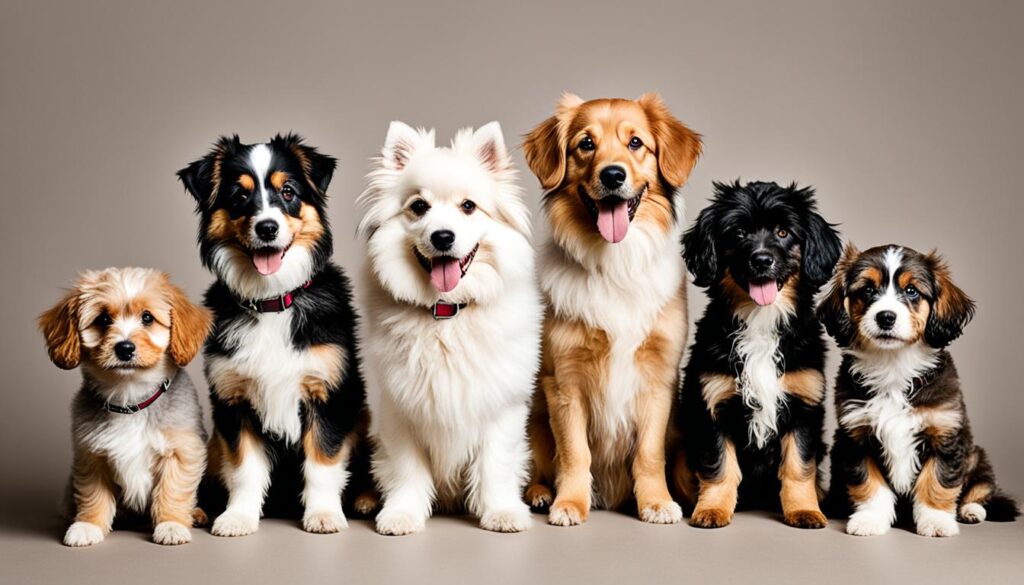
Labrador Retriever – The All-Around Family Dog
Labrador Retrievers are one of the most popular breeds when it comes to finding the perfect all-around family dog. With their friendly and patient nature, these lovable canines are an ideal choice for households of all sizes. Whether you have young children, other pets, or are living on your own, a Labrador Retriever will fit right in.
Labradors are highly trainable and versatile, making them suitable for various activities. Whether you’re looking for a dog to accompany you on long hikes, participate in agility trials, or simply enjoy leisurely walks around the neighborhood, a Labrador Retriever will happily join you in any endeavor.
One of the standout traits of the Labrador Retriever is their loyalty. They form strong bonds with their owners and are always eager to please. This makes them excellent companions and ensures a loving and devoted relationship.
Labradors are known for their good temperament and love for people. They are great with children, patient and gentle, making them an ideal choice for families. Their friendly nature also extends to other dogs, as they are generally sociable and enjoy the company of their furry friends.
| Gentleness | Sociability | Trainability | Energy Level |
|---|---|---|---|
| Highly Gentle | Very Sociable | Easily Trainable | Moderate Energy Level |

Labradors do require regular exercise to keep them mentally and physically stimulated. A daily walk or playtime in the yard is essential for their well-being. They thrive in active households and make wonderful companions for outdoor adventures.
With their winning combination of friendliness, trainability, and versatility, it’s no wonder that the Labrador Retriever is renowned as the all-around family dog. Whether you’re looking for a furry playmate for your children, a loyal companion for yourself, or a versatile partner for various activities, a Labrador Retriever will bring love, joy, and endless wagging tails to your home.
Bulldog – The Loyal Companion
Bulldogs are known for their calm and friendly temperament, making them excellent companions for families. They adapt well to different environments and are comfortable in both city and country settings. Bulldogs are loyal, courageous, and love spending time with their families. Although they may not be highly active, they require regular exercise and grooming to keep them healthy and happy.
Here are some key characteristics of Bulldogs:
| Characteristics | Description |
|---|---|
| Temperament | Bulldogs have a calm and friendly nature, making them great companions for families. |
| Adaptability | They can adapt well to different environments, whether it’s a city apartment or a countryside home. |
| Loyalty | Bulldogs are known for their loyalty and devotion to their families. |
| Exercise Needs | Although not highly active, Bulldogs still require regular exercise to stay healthy. |
| Grooming | Bulldogs have a short coat that requires regular grooming to keep them clean and free from skin issues. |
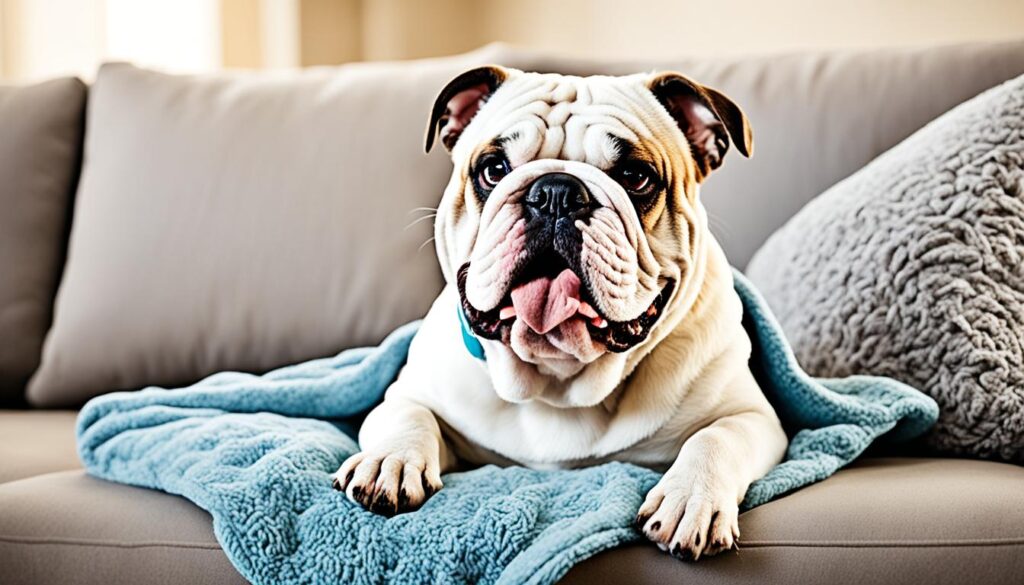
Golden Retriever – The Intelligent and Devoted Breed
Golden Retrievers are intelligent, friendly, and devoted dogs that are highly adaptable. They excel in various activities, including hunting, showing, tracking, and obedience. Golden Retrievers are energetic and require regular exercise to keep them mentally and physically stimulated. They are great with children and other dogs, making them an ideal choice for families.
The Many Talents of Golden Retrievers
Golden Retrievers are not only known for their stunning appearance but also for their exceptional abilities. Their intelligence and versatility make them suitable for a wide range of activities and roles.
- Search and Rescue: Golden Retrievers have a keen sense of smell and are often trained to assist in search and rescue operations. Their determination and focus make them invaluable in locating missing persons or survivors.
- Therapy Dogs: With their friendly and gentle nature, Golden Retrievers make excellent therapy dogs. They provide comfort, support, and affection to individuals in hospitals, nursing homes, and other therapeutic settings.
- Service Dogs: Due to their intelligence and trainability, Golden Retrievers are frequently trained as service dogs. They assist individuals with disabilities with tasks such as opening doors, retrieving items, and providing physical support.
- Guide Dogs: Golden Retrievers are well-suited to be guide dogs for individuals with visual impairments. Their ability to navigate obstacles and their attentive nature make them reliable and trusted companions.
Golden Retrievers and Family Life
Golden Retrievers are known for their friendly and sociable nature, which makes them perfect companions for families. They are incredibly patient, especially with children, and have a natural instinct to protect and care for their loved ones.
“Golden Retrievers are not just pets; they become cherished members of the family. Their loyalty and devotion are unmatched, and they bring immense joy to our lives.” – Amanda Thompson, Golden Retriever Owner
Whether it’s playing fetch in the backyard, going for long walks, or simply cuddling on the couch, Golden Retrievers thrive on spending time with their families. Their joyful and affectionate demeanor creates strong bonds, making them an integral part of family life.
Exercise and Mental Stimulation
To keep Golden Retrievers happy and healthy, regular exercise and mental stimulation are vital. These energetic dogs require daily activities that challenge their intelligence and provide an outlet for their energy.
Activities that Golden Retrievers particularly enjoy include:
- Retrieving: Golden Retrievers have a natural instinct for retrieving objects. Playing fetch is not only a great way to exercise them physically but also engages their mental capabilities.
- Swimming: With their water-repellent coats and love for water, Golden Retrievers are excellent swimmers. Swimming provides a low-impact exercise that is easy on their joints.
- Hiking: Taking Golden Retrievers on hikes is a fantastic way to provide them with mental and physical stimulation. They love exploring new environments and challenges.
- Obedience Training: Golden Retrievers are eager to please and respond well to training. Engaging them in obedience classes or teaching them new tricks enhances their mental abilities.
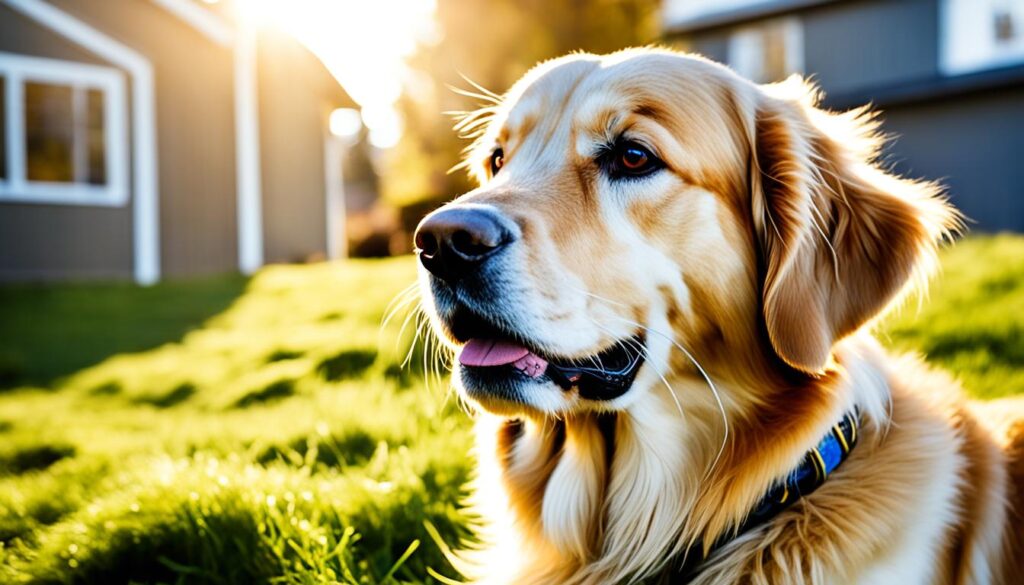
| Golden Retriever Traits | Description |
|---|---|
| Lifespan | 10-12 years |
| Size | Medium to large |
| Coat | Medium-length, water-repellent, requires regular grooming |
| Temperament | Intelligent, friendly, loyal, patient |
| Exercise Needs | High – requires daily exercise and mental stimulation |
Beagle – The Merry and Curious Companion
Beagles are beloved for their merry, friendly, and curious personalities. These adorable dogs have a unique charm that has made them a popular choice for families all across the world.
With their merry disposition, beagles bring a joyful and lively energy to any home. They have a natural zest for life and are always ready to explore their surroundings. This merry nature makes them wonderful playmates for children and other dogs, creating a harmonious and joyful environment.
Beagles are known for their inquisitive and curious nature. They have a keen sense of smell and a love for following scents, which can make walks and outdoor adventures exciting for both the dog and its owner. Their curiosity also extends to their surroundings, as beagles love to investigate their environment and discover new things.
“Beagles have an innate desire to explore the world around them. Their curiosity and sense of adventure make them amazing companions for families who enjoy outdoor activities.”
Due to their high activity level, beagles require plenty of exercise and mental stimulation. Regular walks, playtime, and engaging toys are essential to keep them happy and prevent boredom. Daily activities not only help them release their energy but also promote their overall well-being.
Grooming and training are also crucial aspects of caring for a beagle. They have short, dense coats that are relatively low-maintenance, requiring occasional brushing to keep them clean and healthy. Training should start early to establish boundaries and good behavior, as beagles can be independent thinkers.
Overall, beagles make merry and curious companions that bring joy and adventure to any household. Their friendly nature, love for exploration, and compatibility with children and other dogs make them an excellent choice for families seeking a loyal and energetic furry friend.
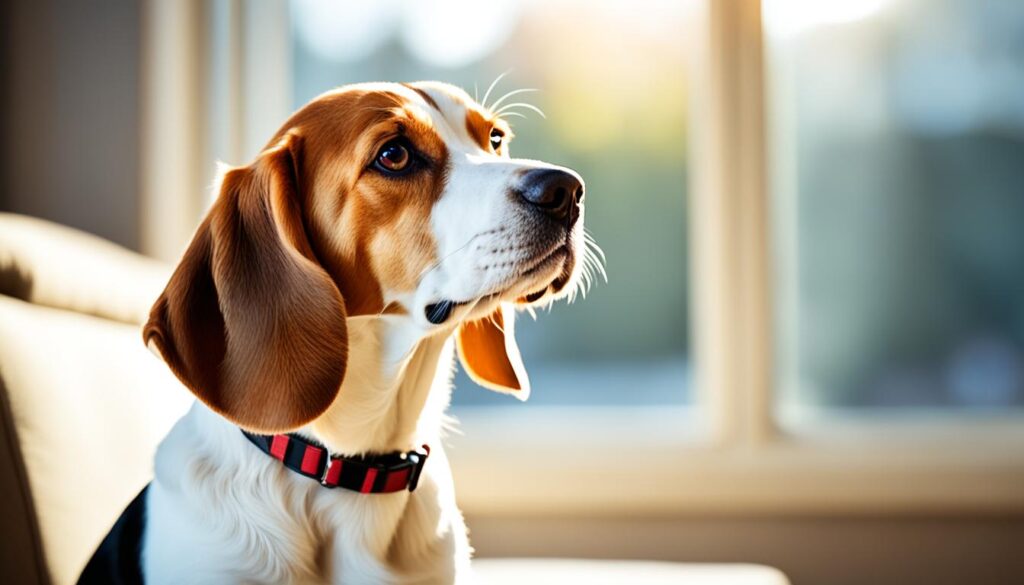
Conclusion
In conclusion, choosing the right breed of dog for your home is essential to ensure a harmonious living environment. Consider factors such as your housing situation, energy levels, exercise needs, shedding, trainability, and allergies when making your decision.
If you have limited living space, small house dog breeds are a great choice. These breeds, such as Chihuahuas, French Bulldogs, Pomeranians, and Boston Terriers, require less exercise and space but still provide the love and companionship you desire.
For those with larger homes or yards, medium and large breeds like Cocker Spaniels, Border Collies, Australian Shepherds, and Bulldogs could be the perfect fit. These breeds offer a good balance of energy levels and are great with children and other pets.
If you or a family member suffers from allergies, consider hypoallergenic dog breeds like Poodles, Bichon Frises, Shih Tzus, and Maltese. These breeds produce fewer allergens and shed less, reducing the risk of triggering allergies.
Popular house dog breeds like Labrador Retrievers, Bulldogs, Golden Retrievers, and Beagles are known for their friendly nature and make excellent companions. By carefully considering your needs and lifestyle before making a decision, you can find the perfect furry companion that brings joy to your home.





